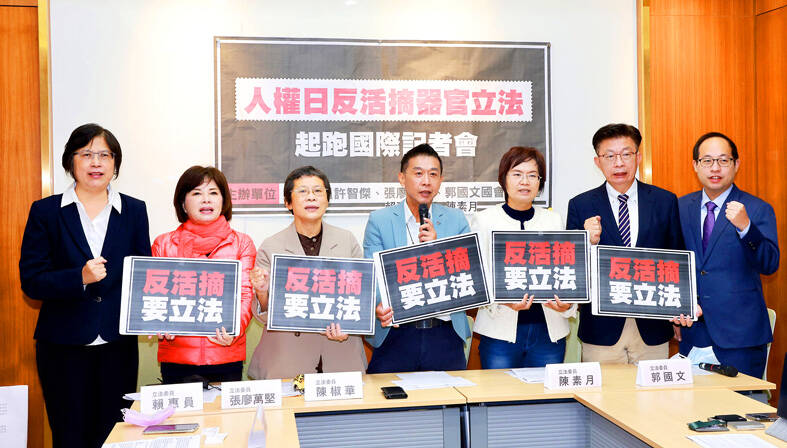A law banning forced organ harvesting should be enacted, lawmakers across party lines said yesterday ahead of International Human Rights Day today.
Democratic Progressive Party (DPP) Legislator Hsu Chih-chieh (許智傑) held an international news conference at the legislature in Taipei with other legislators and civic groups to propose the enactment of a law to combat and prevent forced organ harvesting, saying it continues to occur in countries such as China and Cambodia.
Taiwan should use its power to “stop the atrocities committed by the Chinese Communist Party” by establishing stronger laws and regulations to prevent organ harvesting, which is a cruel act “despised by the whole world,” Hsu said.

Photo: CNA
Teresa Chu (朱婉琪), a lawyer and chair of the Universal Declaration on Combating and Preventing Forced Organ Harvesting Advisory Committee, said that some Taiwanese colluded with foreign crime organizations to lure people in Taiwan to Cambodia, where they were forced to undergo organ harvesting.
Many Taiwanese went to China to engage in the organ trade for fast organ transplants, she said, adding that some doctors even assisted in illegal organ transplant operations there.
A law banning forced organ harvesting is “desperately needed,” she said.
Taiwan Association for International Care of Organ Transplants Huang Chien-feng (黃千峰), a doctor, said that China lacks organ donation regulations, but has a huge stock of organs from living bodies, 90 percent of which are from death-row inmates.
It is believed that inmates’ organs would be removed without anesthesia, and they would then die from the operation, he added.
There is a huge gap between the number of people being sentenced to death and the number of liver and kidney transplants performed in China, he said.
The organs were most likely taken from Falun Gong members, Uighurs or political prisoners, he added.
DPP Legislator Chen Su-yueh (陳素月) said that the atrocities should be condemned, and she called on the public to pay attention to the issue.
New Power Party Legislator Chen Jiau-hua (陳椒華) advocated the proposal, as there might be social repercussions from Taiwanese being forced to undergo organ harvesting or receiving organ transplants in China.
DPP Legislator Lai Su-yueh (賴素月) said that a “global legal net” should be created to punish and prevent crimes through information exchanges among countries.
Many people have fallen victim to forced organ harvesting in China, which is thought to have been happening for more than a decade, DPP Legislator Kuo Kuo-wen (郭國文) said, adding that parties should work together and prioritize the law’s enactment.
DPP Legislator Chang Liao Wan-chien (張廖萬堅) said that the world is “building legal firewalls” to prevent such atrocities.

‘DENIAL DEFENSE’: The US would increase its military presence with uncrewed ships, and submarines, while boosting defense in the Indo-Pacific, a Pete Hegseth memo said The US is reorienting its military strategy to focus primarily on deterring a potential Chinese invasion of Taiwan, a memo signed by US Secretary of Defense Pete Hegseth showed. The memo also called on Taiwan to increase its defense spending. The document, known as the “Interim National Defense Strategic Guidance,” was distributed this month and detailed the national defense plans of US President Donald Trump’s administration, an article in the Washington Post said on Saturday. It outlines how the US can prepare for a potential war with China and defend itself from threats in the “near abroad,” including Greenland and the Panama

The High Prosecutors’ Office yesterday withdrew an appeal against the acquittal of a former bank manager 22 years after his death, marking Taiwan’s first instance of prosecutors rendering posthumous justice to a wrongfully convicted defendant. Chu Ching-en (諸慶恩) — formerly a manager at the Taipei branch of BNP Paribas — was in 1999 accused by Weng Mao-chung (翁茂鍾), then-president of Chia Her Industrial Co, of forging a request for a fixed deposit of US$10 million by I-Hwa Industrial Co, a subsidiary of Chia Her, which was used as collateral. Chu was ruled not guilty in the first trial, but was found guilty

A wild live dugong was found in Taiwan for the first time in 88 years, after it was accidentally caught by a fisher’s net on Tuesday in Yilan County’s Fenniaolin (粉鳥林). This is the first sighting of the species in Taiwan since 1937, having already been considered “extinct” in the country and considered as “vulnerable” by the International Union for Conservation of Nature. A fisher surnamed Chen (陳) went to Fenniaolin to collect the fish in his netting, but instead caught a 3m long, 500kg dugong. The fisher released the animal back into the wild, not realizing it was an endangered species at

DEADLOCK: As the commission is unable to forum a quorum to review license renewal applications, the channel operators are not at fault and can air past their license date The National Communications Commission (NCC) yesterday said that the Public Television Service (PTS) and 36 other television and radio broadcasters could continue airing, despite the commission’s inability to meet a quorum to review their license renewal applications. The licenses of PTS and the other channels are set to expire between this month and June. The National Communications Commission Organization Act (國家通訊傳播委員會組織法) stipulates that the commission must meet the mandated quorum of four to hold a valid meeting. The seven-member commission currently has only three commissioners. “We have informed the channel operators of the progress we have made in reviewing their license renewal applications, and